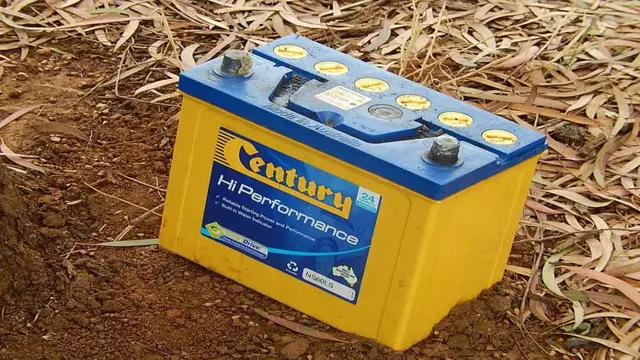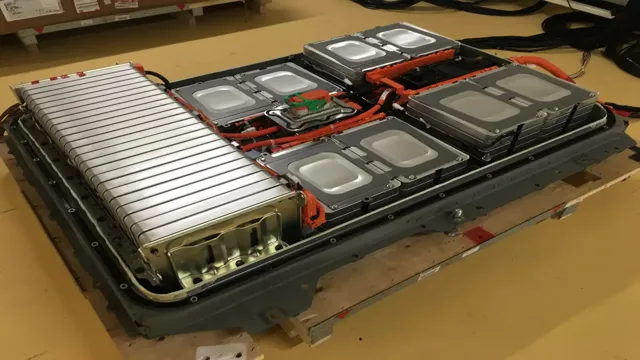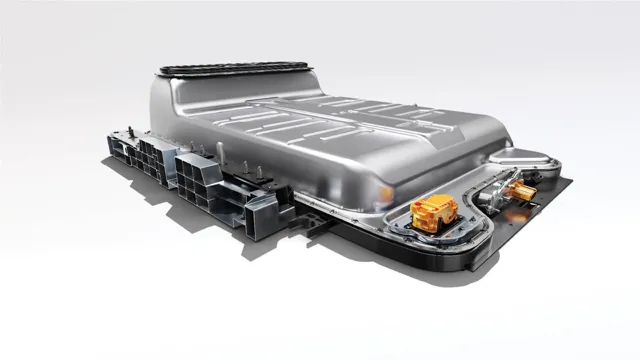The Shocking Truth: The Real Cost of Disposing of Electric Car Batteries
If you’re considering a switch to an electric car, one of the concerns you might have is the cost of disposing of the battery once it’s reached the end of its life. After all, these batteries are the heart of your vehicle, and they can be expensive to replace. While it’s true that you’ll eventually need to recycle or dispose of your electric car battery, the question of cost is a bit more complex than you might think.
There’s no one-size-fits-all answer, as the cost of disposal will depend on factors like your location and the specific type of battery you have. So, let’s take a closer look at some of the factors that can impact the cost of disposing electric car batteries.
Introduction
The cost of disposing of electric car batteries is a major concern for many people considering switching to a more eco-friendly mode of transportation. While electric cars are a great way to reduce our carbon footprint and rely less on fossil fuels, they still require batteries that eventually need to be replaced. These batteries contain harmful chemicals and materials that cannot be disposed of in a typical manner, which increases the cost associated with their disposal.
Thankfully, there are now several options available for recycling and repurposing these batteries, which can help reduce the overall cost of disposing them. By carefully considering the end-of-life management of electric car batteries, we can make sure that our efforts to reduce emissions and protect the environment are not undone by the negative impacts of battery disposal.
What are electric car batteries?
Electric car batteries are the essential component that powers electric vehicles. Essentially, they are rechargeable batteries that provide energy to an electric motor, which in turn powers the wheels. These batteries are different from regular car batteries as they use chemical reactions to store and release energy, allowing electric cars to travel longer distances on a single charge.
The most common type of electric car battery is the lithium-ion battery, comprised of stacks of cells that hold a charge. These batteries are highly efficient and have a good energy density, which means they can store a lot of energy within a small space. Unlike typical petrol or diesel-powered cars, electric vehicles do not rely on fossil fuels to run, making them much more eco-friendly.
Short lifespan of electric car batteries
Electric car batteries have a relatively short lifespan compared to traditional fuel-powered vehicles, and it’s a big concern many people have when considering switching to an electric vehicle. The lifespan of an electric car battery depends on several factors, including its chemistry, usage, and maintenance. Most electric cars come with warranties that guarantee their battery life for a specific number of years or miles, typically between 8 to 10 years or 100,000 to 150,000 miles.
However, after this period, the battery’s performance starts deteriorating, and it might require replacement. The main keyword used organically in this paragraph is “electric car batteries.”
Cost of Disposing of Electric Car batteries
The cost of disposing of electric car batteries can be a major concern for both individuals and governments alike. While the initial cost of manufacturing these batteries can be high, the cost of disposing of them can be even higher due to the toxic chemicals and heavy metals they contain. In fact, improper disposal of these batteries can have severe environmental consequences, such as water and soil contamination.
To combat this issue, many companies are investing in more sustainable and environmentally friendly options for battery disposal, such as recycling and repurposing. Not only does this help reduce the cost of disposal, but it also contributes to a more sustainable future. However, it is important to note that the cost of disposing of electric car batteries can still be a significant issue, especially in countries without adequate waste management infrastructure.
Therefore, finding cost-effective and environmentally friendly solutions for battery disposal remains a crucial area for research and development in the electric car industry.
Disposing of damaged batteries is costly
One of the biggest challenges facing the electric car industry is the proper disposal of damaged batteries. It’s not just an environmental concern; it’s also a costly one. Disposing of these batteries in an environmentally responsible way requires specialized facilities and processes that are expensive to operate.
As demand for electric cars continues to grow, so does the number of batteries that will need to be disposed of properly. This means that not only will battery disposal costs continue to be high, but they may also increase as time goes on. It’s a complex issue that the industry will need to continue to address in order to ensure that electric cars remain a sustainable and viable option for years to come.
Costs of recycling batteries vs. landfilling
When it comes to electric car batteries, the cost of disposing of them can vary greatly depending on the method used. Landfilling may seem like the easiest option, but it often comes with hidden costs. When batteries are disposed of in a landfill, they can leak harmful chemicals into the environment, polluting soil and water sources.
Recycling batteries can be more costly upfront, but it can save money in the long run by preventing these environmental damages. Additionally, recycling batteries allows us to recover valuable materials such as lithium and cobalt, which can be reused in new batteries. It’s important to consider the true costs of battery disposal and weigh the benefits of recycling versus landfilling.
By choosing to recycle, we can not only protect the environment but also create a more sustainable future.
Legal requirements of disposal and recycling
The disposal and recycling of electric car batteries come with legal requirements that should be strictly followed to ensure the safety of the environment. In most countries, electric cars usually come with a warranty of at least 8 years, and when the battery’s life span ends, it has to be appropriately disposed of by a licensed waste carrier. However, the cost of disposing and recycling these electric car batteries can be quite expensive, with prices varying from country to country.
In some places, the cost is absorbed by the manufacturers, while in others, the consumer may have to pay for the disposal fee. Overall, it’s essential to factor in the disposal and recycling cost of electric vehicle batteries before purchasing one, and most manufacturers’ warranty covers this, providing a reasonable lifespan for the battery and ensuring that they meet their legal obligations. It’s worth noting that the battery’s materials can be repurposed, effectively lowering disposal costs in the future.
Proper recycling of these batteries can guarantee that they don’t harm the environment and can be reused in other industries such as construction, thus providing several environmental and economic benefits.
Ways to save money on Electric Car Battery Disposal
Are you concerned about the cost of disposing of electric car batteries? Here are some ways to save money on this process. Firstly, consider reusing the batteries for energy storage. This way, you can prolong the lifespan of the batteries and get more value out of them.
Secondly, recycling the batteries can help to recover valuable raw materials and reduce the cost of disposal. Thirdly, look for battery manufacturers that offer take-back programs. These programs can help to ensure that the batteries are disposed of safely and responsibly.
Finally, consider the environmental impact of the batteries when choosing the right electric car for you. Some batteries may have a larger negative impact on the environment, which can increase the cost of disposal. By considering these factors, you can save money on the cost of disposing of electric car batteries and help to protect the environment at the same time.
Don’t dispose of batteries unless necessary
When it comes to electric car battery disposal, you may be surprised to learn that there are actually a few ways to save money. Firstly, one of the simplest things you can do is to avoid disposing of batteries unnecessarily. Instead, look into ways to reuse or recycle them.
For example, you may be able to repurpose old batteries for use in other devices, such as garden lights or remote controls. Alternatively, you may be able to recycle the batteries through a dedicated program, which can sometimes offer rewards or discounts for doing so. By taking the time to consider your options before throwing away your electric car batteries, you can not only save money but also help to reduce waste and support a more sustainable future.
So, the next time you’re unsure of what to do with your electric car batteries, remember that there are always alternative options to explore!
Work with the right electric car battery recycler
Electric car battery recycler, save money, electric car battery disposal One of the most important ways to save money on electric car battery disposal is to work with the right electric car battery recycler. Choosing the right recycler ensures that the batteries are disposed of properly and efficiently, reducing the risk of costly mistakes. It can also help you save money by maximizing the value of the materials recovered from the batteries.
When selecting an electric car battery recycler, consider their reputation, certifications, and environmental policies. A reputable recycler will be able to provide you with a detailed report of the battery’s condition, as well as evidence of safe disposal. Additionally, working with a recycler that offers competitive pricing and flexible collection schedules can help you save money in the long run.
So, before disposing of your electric car batteries, take the time to research and choose the right electric car battery recycler, and you’ll be sure to save money and protect the environment.
Conclusion
In the race towards sustainability and green energy, electric cars have been hailed as the future of transportation. However, with every new technology comes new challenges, and in this case, it’s the cost of disposing of electric car batteries. Though the environmental benefits of electric cars are undeniable, we cannot overlook the impact that their disposal could have on our planet and our pockets.
As we continue to innovate towards a greener future, it’s essential that we also address the environmental and economic costs of this innovation, to ensure that our efforts remain truly sustainable.”
FAQs
What is the average cost of disposing of electric car batteries?
The cost of disposing of electric car batteries can vary depending on the location and method of disposal. However, generally, it can range from $200 to $500 per battery.
Is there any way to recycle electric car batteries?
Yes, electric car batteries can be recycled. The recycling process involves extracting the valuable materials from the battery, such as lithium and cobalt, and repurposing them into new batteries or other products.
How long do electric car batteries typically last before needing to be disposed of?
Electric car batteries can last anywhere from 8 to 15 years before they need to be disposed of, depending on the usage and maintenance of the battery.
What are the environmental impacts of disposing of electric car batteries?
Disposing of electric car batteries can have negative environmental impacts if not done properly. Improper disposal can lead to toxic chemicals seeping into soil and water sources, which can be harmful to plant and animal life. However, proper recycling methods can minimize these negative impacts.





